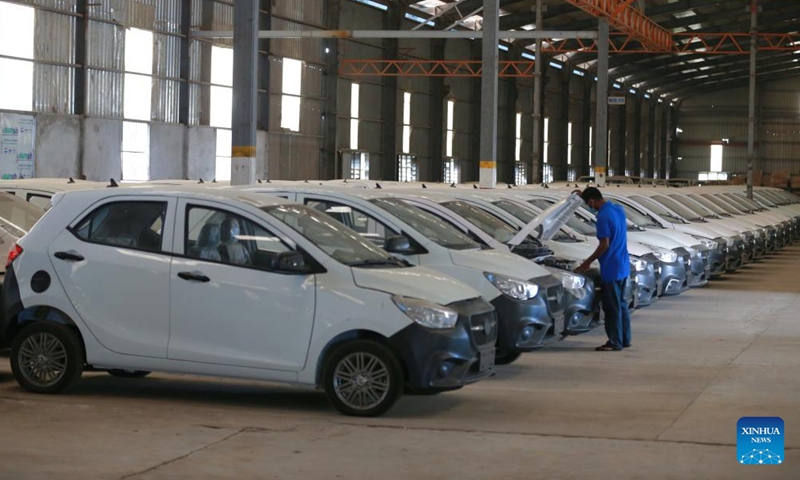
New energy vehicles are seen at the Khaingkhaing Sangda Motorcar Development Center in Yangon, Myanmar, March 9, 2022.Photo:Xinhua
Despite the reported cancellation of Chinese-invested solar power projects by Myanmar authorities, most Chinese companies are confident of the investment prospects in Myanmar, though some have expressed concerns about whether political volatility may cast shadows on their businesses there.
While the US has increasingly viewed ASEAN as a geopolitical battlefield to confront China and sought all means to deter China's investment, analysts said that the US is unlikely to succeed in availing itself of opportunities to rope in Southeast Asian countries and damage booming China-ASEAN economic and trade relationships.
Myanmar's government cancelled tenders by Chinese companies for the construction and operation of 28 solar power plants for "breaching the tender regulations," the Irrawaddy reported.
The media report said that the companies "repeatedly postponed signing the power purchase agreements" after the military took over state power in February 2021. Among the listed companies are Sungrow Power Supply Co and a consortium of Shwe Taung Development Co & GCL System Integration Technology.
A manager surnamed Lu with GCL System Integration Technology Co (GCL), which specializes in clean energy, confirmed to the Global Times on Wednesday that the company won bids for two photovoltaic (PV) projects in Myanmar last year, but both have been delayed due to Myanmar's political upheaval.
"The projects have been halted since last year, without clear information from the Myanmar authorities" about what we should do," Lu said, noting that the company invested a lot of human resources and capital in the bidding process.
Each of the PV projects was of around 50 megawatts, and construction should have been completed by the end of 2022 according to the original schedule, the Global Times learned.
"The project is conducive to Myanmar's energy supply since local power resources are relatively scarce. After entering operation, the plants will be connected to the local power grid for industrial and residential use," the manager said.
The canceled projects would have been a relatively small proportion of the company's global business layout, since GCL mainly focuses on Europe, North and South America and Southeast Asia markets, while Myanmar accounts for about 1-2 percent of the total.
Lu said the company will remain cautious in the future about investment in Myanmar due to volatile political situation there.
However, the incident didn't seem to affect most Chinese companies' confidence in investing in Myanmar against the backdrop of improving economic and trade cooperation between China and Southeast Asian countries.
A manager with a large state-owned infrastructure company whose project was cancelled told the Global Times that there was hardly any reason for the cancelation except that the new government no longer recognizes earlier bids.
"However, our company's business in Myanmar would continue, and our investment is unlikely to be affected," the manager said.
Chinese companies' projects in Myanmar have recovered well since February last year, with some power projects remaining in normal operation, a source familiar with the Myanmar situation told the Global Times on Tuesday.
"With the improvement of the business environment in Myanmar, some Chinese centrally administered enterprises have been making inspection trips to the Southeast Asian country for potential opportunities, mainly in the infrastructure sector," the person said.
However, the Central Bank of Myanmar requires that all foreign currencies earned by locals must be exchanged for local currency within one working day. This has created some disruptions, as Chinese companies are not able to exchange their profits into yuan for transfer back to China, he said. It will affect Chinese companies' investment and sales in Myanmar in the short term.
Recently, the US has hastened efforts to step up economic engagement with ASEAN countries in order to put some pressure on China.
ASEAN and the US are to convene a special summit on Thursday and Friday in Washington, which "will demonstrate the United States' enduring commitment to ASEAN, and recognize its central role in delivering sustainable solutions to the region's most pressing challenges," reads a statement on the White House website.
"The US may propose some new agendas at the meeting to court ASEAN but it is unlikely to impact the booming economic and trade relationships between China and ASEAN," Zhao Gancheng, a research fellow at the Shanghai Institute for International Studies, told the Global Times on Wednesday.
ASEAN remained China's largest trade partner in the first four months of 2022, accounting for 14.6 percent of China's total foreign trade, Chinese customs said. China-ASEAN trade totaled 1.84 trillion yuan ($274.5 billion) during the quarter, up 7.2 percent year-on-year.
The Regional Comprehensive Economic Partnership (RCEP) trade agreement, the world's largest free trade deal that came into effect on January 1, 2022, will further promote China-ASEAN economic and trade ties this year.
On Saturday, Xiamen customs in East China's Fujian Province issued a certificate of origin for the export of a batch of easy-open-ends worth $343,000 to Myanmar - the first certificate under the RCEP framework that the province released for export to Myanmar.




